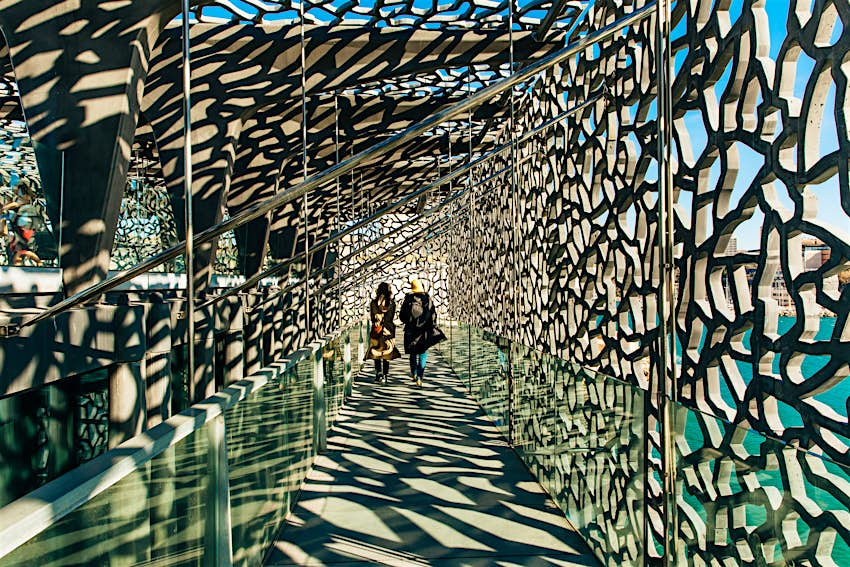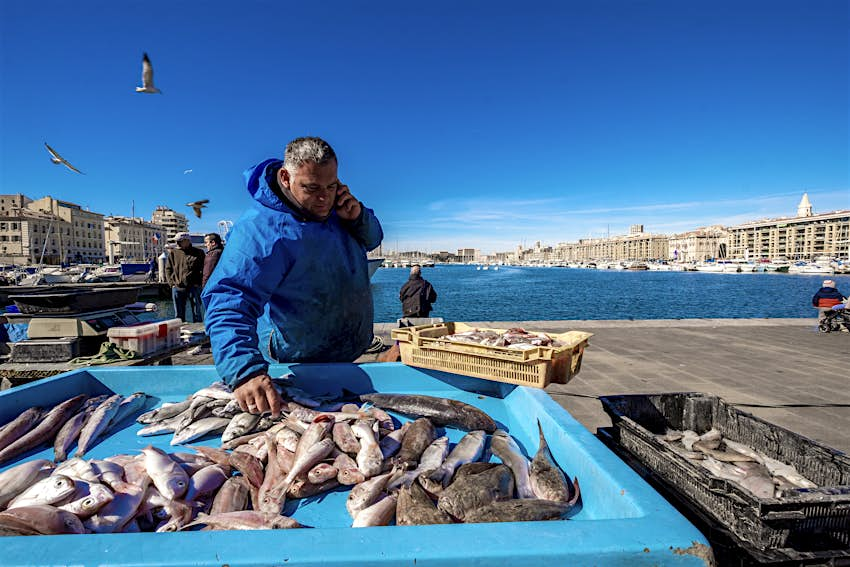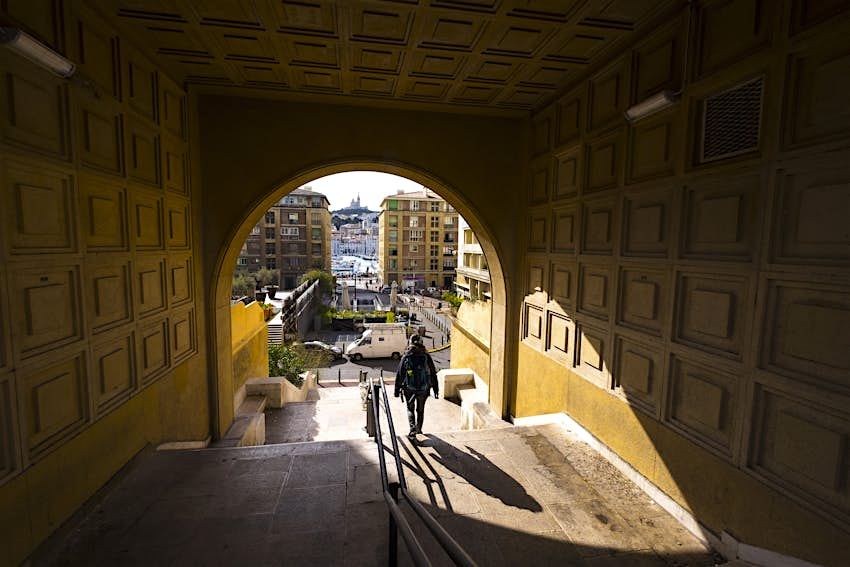Summer is the traditional time to visit this sun-blessed city on the Mediterranean: its big blue sea is toasty warm, urban beaches sizzle with outdoor action, festivals are a dime a dozen, and dancing spills across the sand and on starry rooftops after dark. The party vibe rocks.
Yet there is far more to France’s second-largest city than worshiping the hot southern sun and hobnobbing until dawn. Marseille sports an intriguing portfolio of museums covering everything from fine art, archaeology and history to subaquatic sculpture, street art and soccer – a joy to explore any time of year.
Throw in the city’s impressive cultural agenda – from sacred to electronic music and hip hop, music festivals are multicultural Marseille’s lifeblood – and the region’s bumper harvest of seasonal produce, and you could well be tempted to rethink when you visit. For nature lovers in town for horticultural exotica or seafaring adventure along a bewitching coastline beaded with cliffs and coves, spring and fall are best. Or perhaps you’re a sea urchin or tripe aficionado? To decide your peak season, this is what you need to know…
High season: June to August ushers beach life and parties on the sand
High season means uncomfortably hot city temperatures – 35°C is fairly common at noon – and urban beaches packed with holidaymakers. The summer festival season is in full swing, with bags of open-air film screenings, rooftop concerts and dance parties to entertain. Hotels and hostels are fully booked, with rates at a premium.
Shoulder season: April, May, September and October are mellow months to visit “sans le crowd”
Shoulder-season temperatures are pleasantly balmy, the school-holiday crowd is yet to descend on the coast, and street markets are heaped with fresh produce from all over Provence. It’s warm enough to swim in the Med and hike along the coast without melting. Spring blooms and autumn foliage cast city parks and gardens in an exquisite light.
Get the inside scoop on the latest cultural happenings all over the world delivered weekly to your inbox with our email newsletter.
Low season: November to March is best for sightseeing on the cheap
The bitterly cold mistral wind whips through the city. Locals button down the hatches and hibernate. The few tourists around revel in exploring near-deserted museums and monuments. Hotel rates are at their lowest, and attractions open shorter hours. Beach restaurants and bars, rooftops and seaside addresses close for winter.

Enjoy solitary January strolls
The very occasional snow flurry might fall on the city, but days are cold and crisp with China-blue skies. Lunch in the sun alfresco is possible, even in January. If you missed the city’s emblematic santon fair (tiny, hand-crafted crib figurines) before Christmas, catch it now.
Key Events: Foire aux Santons
February is for foodies
February can be a cold month, but the oursin (sea urchin) season is on hand to comfort and thrill. The pale-orange roe is the star of every seafood restaurant menu and weekend festivals celebrating the spiny-balled delicacy fill nearby Carry-le-Rouet with gourmet gaiety. Pilgrims weave their way up to Abbaye St-Victor at dawn bearing baskets of traditional Marseillais navettes (orange blossom biscuits) to be blessed at La Chandeleur.
Key Events: Les Oursinades, La Chandeleur (2 February)
March means street parties
With clocks springing forward at the tail end of the month, the days feel longer and spring is in the air. Decorated floats and costumed revelers parade along streets around the Plages du Prado and Parc Borély during carnival’s exuberant street processions.
Key Events: Carnaval de Marseille
April is for setting sail
The sailing season opens, adding picture-postcard white sail boats to Marseille’s panoramic bay views. Days are comfortably warm, café and restaurant terraces pop up like mushrooms after the rain, and cultural happenings return to the stage.

May brings in bountiful markets
Beautiful sunny days are a given. Open-air food markets are piled high with early summer produce from all over Provence, including ruby-red cherries, melons and syrupy figs from the nearby Vaucluse. Muguets (“lily of the valley” blooms) are sold on street corners to mark 1 May.
Key Events: Fête de la Nature, Salon des Vignerons et de la Gastronomie, Rencontres du Cinéma Sud Américain
June kicks of festival season
Freshly harvested garlic is piled high in woven garlands on street stalls at the Vieux Port’s ancient garlic fair – a handful of saffron farmers sell their wares too. World music spills across the streets of ethnically diverse Noailles and live jazz makes toes tap at a quartet of atmospheric outdoor venues, including Centre de la Vieille Charité, MuCEM and Abbaye St-Victor.
July embraces the holiday spirit
School’s out for summer, temperatures soar and cultural life shifts outside. Beaches are packed; movies are screened in parks, squares and courtyards; and rooftop venues and beach clubs buzz until the wee hours. Watch for top-drawer concerts at the beautiful, open-air Théâtre Silvain amphitheater and world champion pétanque players spinning balls in Parc Borély.
August sizzles in the summer sun
The French take vacation and many locals head out of the city. But this is one of the busiest times to be in Marseille, with events galore, an infectious party atmosphere and the start of the new football season (through to May). In nearby Cassis, the first grapes are harvested at the end of the month.
Key Events: La Fête de la Vierge (15 August), Les Joutes de l’Estaque

September’s quiet autumn streets
Temperatures cool and walking trails in the Parc National des Calanques begin to reopen as the risk of wildfire subsides. Contemporary sounds by globetrotting artists rock the uber-cool rooftop of Friche La Belle de Mai. The Cassis wine harvest is in full swing.
October marks the close of the season
The days may be shortening, but the glow of the autumn sun is a delight. It is still warm enough to swim and beaches are blissfully empty. By the end of the month seasonal hotels, restaurants and bars shut for winter.
November welcomes Marseille’s oldest craft fair
The city’s oldest craft fair, with stalls selling Marseillais santons (thumbnail-sized, terracotta figurines for Christmas cribs), opens with a flourish at the Vieux Port – as it has done since 1803. This is the traditional time of year to eat pieds et paquets (sheep’s trotters and stuffed tripe).
December is a festive time
Families celebrate Christmas with midnight Mass, Provençal chants, 13 desserts and nativity scenes. Santonniers (santon makers) are celebrated with their own Mass, either at the tail end of December or early January.
